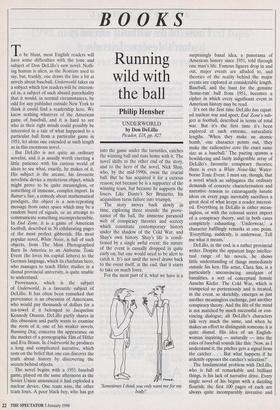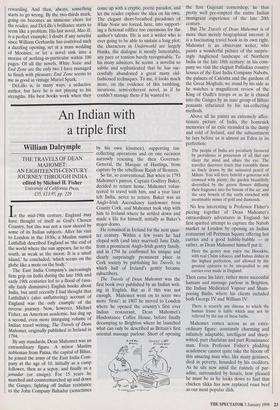BOOKS
Running wild with the ball
Philip Hensher
UNDERWORLD by Don DeLillo Picador, £18, pp. 827 To be blunt, most English readers will have some difficulties with the tone and subject of Don DeLillo's new novel. Noth- ing human is alien, as the Romans used to say, but, frankly, one draws the line a bit at novels about baseball. Underworld takes on a subject which few readers will be interest- ed in, a subject of such absurd parochiality that it would, in normal circumstances, be odd for any publisher outside New York to think it could find a readership here. We know nothing whatever of the American game of baseball, and it is hard to see who in their right minds could possibly be interested in a tale of what happened to a particular ball from a particular game in 1951, let alone one extended at such length as in this enormous novel.
But DeLillo is not quite an ordinary novelist, and it is usually worth exerting a little patience with his curious world of ideas to see what, exactly, he makes of it. His subject is the arcane, his favourite novelistic device a mysterious object, which might prove to be quite meaningless, or something of immense, complex import. In Ratner's Star, a comedy about mathematical prodigies, the object is a non-repeating message from outer space which may be a random burst of signals, or an attempt to communicate something incomprehensible. In End Zone, it is a game of American football, described in 30 exhilarating pages of the most perfect gibberish. His most popular novel, White Noise, is full of such objects, from The Most Photographed Barn In America to an Airborne Toxic Event (he loves his capital letters) to the German language, which its charlatan hero, who manages to teach Hitler studies in a dismal provincial university, is quite unable to understand.
Provenance, which is the subject of Underworld, is a favourite subject of DeLillo. It has often been remarked that provenance is an obsession of Americans, who would pay thousands of dollars for a tea-towel if it belonged to Jacqueline Kennedy Onassis. DeLillo partly shares in this obsession and partly wants to examine the roots of it; one of his weaker novels, Running Dog, concerns the appearance on the market of a pornographic film of Hitler and Eva Braun. In Underworld he produces a long and complicated narrative, which rests on the belief that one can discover the truth about history by discovering the secrets behind objects.
The novel begins with a 1951 baseball game, played on the same afternoon as the Soviet Union announced it had exploded a nuclear device. One team wins, the other team loses. A poor black boy, who has got into the game under the turnstiles, catches the winning ball and runs home with it. The novel shifts to the other end of the story, and to the hero of the novel, Nick Shay, who, by the mid-1990s, owns the crucial ball. But he has acquired it for a curious reason; not because he is a supporter of the winning team, but because he supports the losers. Like Dante's Ser Brunetto, his acquisition turns failure into triumph.
The story moves back slowly in time, exploring three strands: the prove- nance of the ball, the immense paranoid web of conspiracy theories and secrecy which constitute contemporary history under the shadow of the Cold War, and Shay's own history. Shay's life is condi- tioned by a single awful event; the nature of the event is casually dropped in quite early on, but one would need to be alert to catch it. It's not until the novel draws back to the event itself, at the end, that it starts to take on much force.
For the most part of it, what we have is a `Sometimes I think you on body!' want me for my surprisingly banal idea, a panorama of American history since 1951, told through one man's life. Famous figures drop in and out, major events are alluded to, and theories of the reality behind the major events are explored at considerable length. Baseball, and the hunt for the genuine `home-run' ball from 1951, becomes a cipher in which every significant event in American history may be read.
It's not the first time DeLillo has equat- ed nuclear war and sport; End Zone's sub- ject is football, described in terms of total war. But it's the first time it's been explored at such extreme, naturalistic lengths. 'When they make an atomic bomb,' one character points out, 'they make the radioactive core the exact same size as a baseball.' The pairing spawns a bewildering and fairly indigestible array of DeLillo's favourite conspiracy theories; there is even a White Noise-like Water- borne Toxic Event. I must say, though, that a novel which so subjugates the ordinary demands of concrete characterisation and narrative tension to extravagantly lunatic ideas on every page inevitably sacrifices a great deal of what keeps a reader interest- ed. Everything in DeLillo is either mean- ingless, or with the colossal secret import of a conspiracy theory, and in both cases completely exhausting. 'Underwear,' a character bafflingly remarks at one point. `Everything, suddenly, is underwear. Tell me what it means.'
DeLillo, in the end, is a rather provincial writer. Despite the apparent huge intellec- tual range of his novels, he shows little understanding of things immediately outside his ken. His artist, Clara Sax, is a particularly unconvincing amalgam of banalities, a sort of conceptual female Anselm Kiefer. The Cold War, which is trumpeted so portentously and is treated, in the event, so sketchily, emerges as just another meaningless exchange, just another conspiracy theory. And the life of the mind is not matched by much successful or con- vincing dialogue; all DeLillo's characters talk very much the same, and when he makes an effort to distinguish someone it is quite dismal. His idea of an English- woman inquiring — naturally — into the rules of baseball sounds like this: 'Now, as I understand it, the pitcher gets a signal from the catcher . . . But what happens if he ardently opposes the catcher's selection?'
The fundamental problem with DeLillo, who is full of remarkable and brilliant things, is his lack of narrative drive. Every single novel of his begins with a dazzling flourish; the first 100 pages of each are always quite incomparably inventive and rewarding. And then, always, something starts to go wrong. By the two-thirds mark, going on becomes an immense chore for the reader, and DeLillo's brilliance starts to seem like a problem. His last novel, Mao II, is a perfect example; I doubt if any novelist since William Gerhardie has contrived such a dazzling opening, set at a mass wedding of Moonies, or let a novel sink into a morass of nothing-in-particular within 100 pages. Of all the novels, White Noise and End Zone are the only two I have managed to finish with pleasure; End Zone seems to me as good as vintage Muriel Spark. DeLillo is, in many ways, a seductive author, but here he is not playing to his strengths. His best books work when they come up with a cryptic, poetic paradox, and let the reader explore the idea on his own. The elegant short-breathed paradoxes of White Noise are forced, here, into support- ing a fictional edifice too enormous for the author's talents. He is not a writer who is ever going to be able to sustain a long plot; the characters in Underworld are largely blanks, the dialogue is mostly lamentable, any pace or tension barely recognisable. To his many admirers, he seems a novelist so subtle and sophisticated that he has suc- cessfully abandoned a great many old- fashioned techniques. To me, it looks much more, on the evidence of this rambling, incurious, semi-coherent novel, as if he couldn't manage them if he wanted to.



















































 Previous page
Previous page